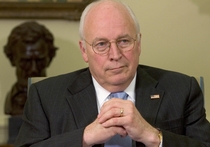 What makes Dick Cheney so unusual a Vice President is that he knows this is his last gig. He really couldn’t give two hoots who he ticks off because after this it is time for the carpet slippers.
What makes Dick Cheney so unusual a Vice President is that he knows this is his last gig. He really couldn’t give two hoots who he ticks off because after this it is time for the carpet slippers.
When Bush picked Cheney in 2000, the general view was that this was a good thing as it would mean that Cheney could give Bush advice without worrying about what the voters of Iowa and New Hampshire would make of it. It also meant that he didn’t need Bush’s help to win the Republican nomination, so he could give Bush frank advice unworried about the consequences of offending the president. But over the course of Bush presidency it has become apparent that Cheney’s liberation from political constraints has made him utterly contemptuous of anyone else, outweighing the other benefits.
Quite how empowered Cheney feels becomes apparent in this snippet from a forthcoming bio of him, flagged up by TNR. We join Cheney as he preps for a TV interview shortly after Bush has fired his old friend Don Rumsfeld:
An aide fired one tough question after another at the vice president. Then: Did you agree with President Bush’s decision to replace Donald Rumsfeld as secretary of defense?
“Absolutely not,” Cheney replied without elaborating. His answer surprised the small group with him, but it was the answer he was determined to give if Wallace asked, even at the risk of angering his boss. But the story was a month old, and Wallace never asked the question.
If Wallace had asked the question, this story would have been huge: the Vice President accusing the President of bowing to political pressure to sack the secretary of defense as America fights two wars. Indeed, the reason the interviewer probably didn’t ask the question is that he couldn’t imagine that the vice president would be so irresponsible, and disloyal, as to publicly slam his boss.






Comments